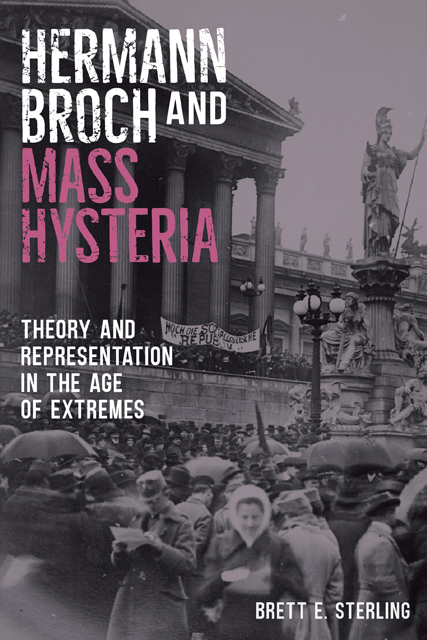Book contents
- Frontmatter
- Dedication
- Contents
- Acknowledgments
- List of Abbreviations
- Introduction
- 1: First Encounters, 1918–1929
- 2: The Power of Literature
- 3: The Mass Takes Shape: Literary Representations
- 4: Theory and Its Discontents: The Massenwahntheorie
- 5: The Threshold of Experience: Die Verzauberung
- Conclusion
- Bibliography
- Index
Introduction
Published online by Cambridge University Press: 11 January 2023
- Frontmatter
- Dedication
- Contents
- Acknowledgments
- List of Abbreviations
- Introduction
- 1: First Encounters, 1918–1929
- 2: The Power of Literature
- 3: The Mass Takes Shape: Literary Representations
- 4: Theory and Its Discontents: The Massenwahntheorie
- 5: The Threshold of Experience: Die Verzauberung
- Conclusion
- Bibliography
- Index
Summary
In her introduction to the first volume of Hermann Broch’s essays, Dichten und Erkennen (Writing and Cognition, 1955), Hannah Arendt described the author’s life as a triangular field defined by three distinct occupations: Dichten (creative writing), Erkennen (cognition), and Handeln (action). A look at Broch’s writings reveals how these central impulses resulted in a restlessness that pulled him in competing directions throughout his career. As an intellectual, his pursuits oscillated between literature on the one hand and science and philosophy as theory on the other, but in either case he was guided by the ethical imperative to perform work that would improve the state of humanity through action. His movement between the triple poles of literature, science, and politics resulted in a body of literary and theoretical production that was formally innovative, deeply analytical, and never an end in itself. The triangular field that Arendt describes is useful for understanding the various paths taken and conflicts present in Broch’s life and work, specifically his ambivalent relationship to literature. This study elucidates the ways in which his oeuvre provides a unique opportunity to question the capacities of literature to grant access to new forms of knowledge that exceed the limits of theory.
Born into an assimilated Jewish family of textile manufacturers in Vienna in 1886, Broch was groomed to follow in his father’s footsteps as an industrialist. His father, Josef Broch, viewed literature as a frivolous distraction, and as a result young Hermann was forced to explore his interests in that area in secret. In 1927, when Broch was already in his forties, he decided to abandon the path that his parents had set for him in order to dedicate himself first to philosophical study, and ultimately to a career as a literary author. In his Autobiographie als Arbeitsprogramm (Autobiography as Work Program, 1941), he isolated his literary activities to just eight years, between 1928 and 1936 (KW 9/2, 247). During this brief period, Broch produced several poems, three plays, a series of novellas, and three novels, including one of the masterpieces of the modern novel and modern German-language fiction, his trilogy Die Schlafwandler (The Sleepwalkers, 1929–31).
- Type
- Chapter
- Information
- Hermann Broch and Mass HysteriaTheory and Representation in the Age of Extremes, pp. 1 - 14Publisher: Boydell & BrewerPrint publication year: 2022



